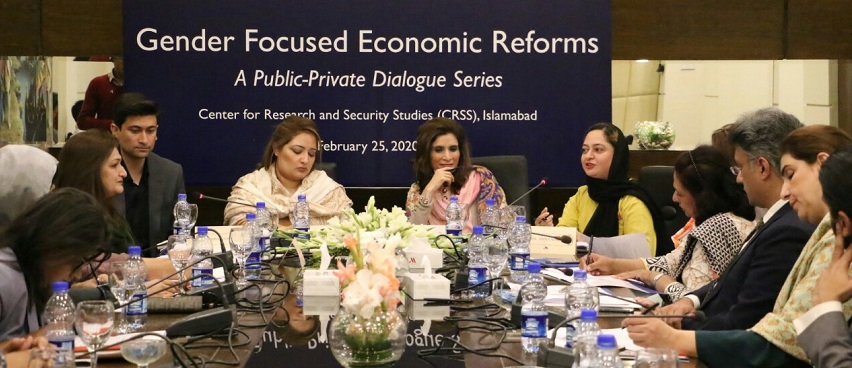Entrepreneurship does not have a gender; not born male or female. It is born with an idea you are excessively in love with; that you would die for. Women need to be enabled politically, socially as well as emotionally, said Ms. Andleeb Abbas, Parliamentary Secretary for Foreign Affairs during the public-private dialogue on Gender Focused Economic Reforms (GFER), organized by Center for Research and Security Studies (CRSS), Islamabad.
She said that if more than half of the country’s overall population is not economically productive, how can we expect a country to develop? Unfortunately, only a small percentage of women; 23% contribute to Pakistan’s economy. Imagine the country’s productive potential, when this number grows over 50% or more. There may be bottlenecks at the policy level, but so as at the social level where the existing traditional mindset to be changed. So, there is a dire need to inculcate self-confidence and self-belief in the female youth leaders to improve participation of women in the future of Pakistan’s economic stability. Women in Pakistan have infinite potential, they just need opportunities for channelizing their potential and talent into a successful future. For aspiring entrepreneurs, it is important to understand that more difficult than starting a business, it is to scale-up, sustain and grow a business. Not only do business women need financial support but more importantly the financial management skills.
Romina Khurshid, Member, National Assembly of Pakistan, while talking on gender equality, noted that both women and men need to work hands in hands, in order to make strong linkages between them. This would allow both to move forward together rather than being mutually exclusive to each other. Romina also seconded Andleeb’s argument of changing mindsets. Why assign women specific roles just on the basis of gender. This dampens their prospects to grow due to the unavailability of equal opportunities of social mobility. Regarding parliamentary affairs, except few political issues, all women in legislature are on one page whenever it comes to issues related to women, she added.
Ms. Amna Malik, President COPAIR and CEO StartUP Pakistan, was of the view that it is crucial to join hands at the social and political level to formulate the critical networks, and work together in solving our issues rather than putting everything on the government, as what the responsible citizenship demands. Majority in Pakistan, even most of the parents want their children to have jobs, and hardly they consider entrepreneurship. Skilled based education and right kind of mentoring is the key in helping women to opt for entrepreneurial activities.
Ms. Aisha Humera Moriani, Joint Secretary (WTO), Ministry of Commerce and Textile, while summing up the dialogue apprised the participants that all chambers need to be connected through a single database, with information sharing mechanism. She also assured the participants that every policy decision is taken – in an inclusive manner – after exhaustive consultations, taking most of the stakeholders on board. For the upcoming Strategic Trade Policy Framework (STPF), many initiatives on gender empowerment have been recommended, which most probably will culminate into the new STPF. This includes women trade facilitation desk, establishment of women entrepreneurs’ network and so on. Lastly, she believed that women must go digital if they have to survive in future, added Ayesha.
Ms. Masooma Sibtain, former Vice President, Federation of Pakistan Chambers of Commerce and Industry (FPCCI) shared the priority intervention areas identified in the women national business agenda (WNBA) – a policy proposal on gender focused economic reforms presented from the platform of FPCCI. She called for the robust feedback of private sector on the potential avenues for enhanced economic participation of women given the impending SME policy and Strategic Trade Policy Framework (STPF) and their importance to reduce the alarming gender gap.
Private sector representatives along with representatives from State Bank, SMEDA, different chambers and think-tanks, after a robust discussion, put forward some key points which include: issues are being repeated again and again, implying that these are not addressed in the first place; more focus is on problems and less on solutions; women should be trained in digital skills and should be offered proper mentoring; formulation of comprehensive data-base on women entrepreneurship and all the other relevant information in this regard; connecting all chambers through a single portal, which would also serve as information sharing channel; ought to bring one window operation and exclusive desks in government departments to facilitate women entrepreneurs and finally there is a dire need for financial literacy and financial management training for women entrepreneurs to grow and sustain their businesses.



